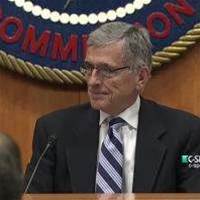United States watchdog the Federal Communications Commission has voted in favour of regulating internet providers like public utilties, making it illegal to discriminate against traffic sent to their customers.

Internet providers can no longer demand that popular sites such as streaming video service Netflix, which generates large amounts of data traffic, pay extra to allow their content to reach customers, or charge fees to ensure better speeds.
The FCC today approved the new rules by a three vote majority, with two Republican commissioners voting against the scheme.
As a result of the FCC vote, internet providers will be regulated under Title II of the US Communications Act, introduced in 1934 to regulate phone companies.
The FCC vote on open internet or net neutrality was closely watched by industry and consumer advocates alike, and is part of push dating back to 2010.
Lobby group the Centre for Democracy and Technology (CDT) welcomed the vote in favour of protecting open internet access.
"By placing open internet protections on clear authority, the FCC has preserved and advanced the basic end-to-end nondiscrimination principle that has been essential to the internet’s evolution, as well as its power as an engine of economic growth and democratic discourse," CDT Open Internet director Erik Stallman said in a statement.
However there are indications that US internet providers and telcos will fight the FCC's efforts to regulate them.
Telco giant AT&T's senior executive vice president of external and legislative affairs Jim Cicconi said the decision by three votes for, two against, "is an invitation to revisiting the decision, over and over and over."
Cicconi said AT&T supported open internet but there should be smart regulation to enable it, not old rules that were written before today's technology existed.
"What doesn’t make sense, and has never made sense, is to take a regulatory framework developed for Ma Bell in the 1930s and make her great grandchildren, with technologies and options undreamed of 80 years ago, live under it," Cicconi said.
ISP and telco Verizon took a similar tack, and issued a "typewritten" press release [PDF], dated February 26, 1934, that criticised the FCC decision as "regrettable" and "wholly unnecessary", forcing providers to abide by a 300 page statute.




_(33).jpg&h=140&w=231&c=1&s=0)
_(20).jpg&h=140&w=231&c=1&s=0)





 iTnews Benchmark Awards 2026
iTnews Benchmark Awards 2026
 iTnews Executive Retreat - Security Leaders Edition
iTnews Executive Retreat - Security Leaders Edition
 iTnews Cloud Covered Breakfast Summit
iTnews Cloud Covered Breakfast Summit
 The 2026 iAwards
The 2026 iAwards












_(1).jpg&h=140&w=231&c=1&s=0)



